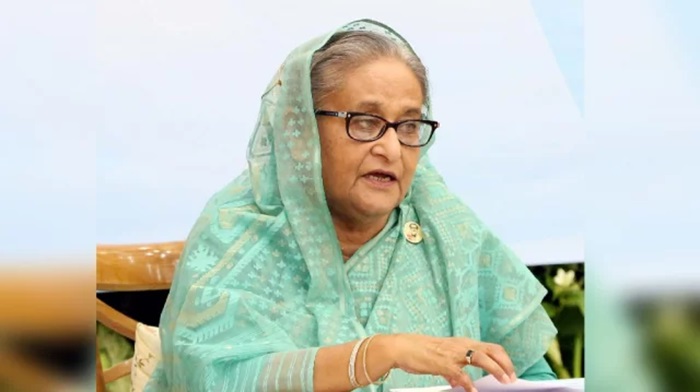
Bangladesh’s Prime Minister, Sheikh Hasina, has etched her name in history by securing a fifth term in office after her Awami League swept the recent national elections. At the age of 76, Hasina once again reaffirmed her status as the world’s longest-serving female head of government. She clinched her fifth term in power with a decisive victory in Sunday’s general election, marking a remarkable journey that includes four consecutive terms. With 223 seats secured out of 299, her Awami League party achieved a comfortable majority, cementing her dominance in the country’s political sphere. Indian Prime Minister Narendra Modi wasted no time in congratulating his Bangladeshi counterpart on this landmark victory, celebrating both her personal achievement and the successful conduct of the elections. Highlighting the deep ties between the two nations, he pledged to further strengthen their close partnership, ensuring a future based on shared values, people-centric ties and mutual respect. This win for Sheikh Hasina not only marks an extraordinary chapter in her political journey but also promises continued momentum for Bangladesh’s development and its ever-growing relationship with India.
Incidentally, one of the star winners is Shakib al Hasan, arguably the most famous cricketer in Bangladesh. Shakib, a candidate for Prime Minister Sheikh Hasina’s party, secured a landslide win in the western town of Magura, adding another illustrious chapter to his already decorated career. This foray into politics marks a fresh start for the veteran all-rounder, who bid a temporary farewell to cricket after the 2023 World Cup to pursue his political aspirations. Shakib’s decisive victory quashed any whispers of retirement, sending a clear message that he intends to excel on both the cricketing and political fronts. As Bangladesh eagerly awaits his next innings, one thing is certain: Shakib’s journey, both on and off the field, promises to be one of continued captivation and success.
The Indian High Commissioner, Pranay Verma, was among the first to call on Prime Minister Hasina in Dhaka, offering congratulations and warm greetings from Prime Minister Modi. The meeting signalled a significant moment, with sources close to the discussions revealing Mr Verma’s sincere hope for an even stronger India-Bangladesh partnership as the Awami League embarks on its new term. This early outreach suggests a shared desire to capitalize on the positive momentum and elevate this crucial relationship to even greater heights in the years to come.
Sheikh Hasina secured a historic fifth term as Bangladesh’s Prime Minister. Her Awami League party dominated the polls, with independents (largely loyal to Awami League) taking 45 and the Jatiya Party managing only eight. Hasina’s victory underlines her success in transforming Bangladesh. Since 2009, under her steady leadership, the nation has become a regional economic powerhouse, surpassing even India in growth trajectory. Millions have been lifted out of poverty, per capita income has tripled, and Bangladesh now stands as the world’s second-largest garment producer.
Bangladesh’s recent economic boom stands as a pillar of Hasina’s legacy. Infrastructure development, poverty reduction, and energy initiatives have driven robust growth. Her firm hand against militancy further bolsters her image. Beyond domestic concerns, Hasina navigates a delicate geopolitical manoeuvre. Balancing powerful neighbours, India and China, she has embraced the Belt and Road Initiative (BRI), securing Chinese investment and weapons contracts. Simultaneously, Hasina’s crackdown on anti-India elements fosters goodwill in Delhi, especially amid Myanmar’s turmoil. With their shared border stretching 4,100 km, the Bangladesh-India partnership becomes increasingly crucial for regional stability. Hasina’s legacy intertwines economic prowess, domestic security, and astute foreign policy, making her a pivotal figure in South Asia.
Speaking to journalists soon after her victory, Hasina outlined her priorities for the next five years as Prime Minister of Bangladesh: ensuring economic growth and faithfully executing projects initiated by her current administration. Her overarching goal, above all, remains the people’s and nation’s development. She underscored her deep personal responsibility towards the electorate, stating, “With motherly affection, I look after them. Their repeated trust through successive elections fills me with a profound sense of duty. As an ordinary citizen entrusted with this extraordinary opportunity, I dedicate myself to their well-being, striving to secure a brighter future for all.” Her words resonated with a heartfelt commitment to serving the people of Bangladesh.
Prime Minister Hasina unveiled an ambitious vision for the future: a nation driven by four pillars of excellence by 2041. This entails fostering a smart population, equipped with the skills and knowledge for the future, alongside a smart government that serves effectively, a smart economy that thrives on innovation, and a smart society bound by unity and progress. Recognizing the crucial role of youth, she emphasized the need to invest in their training and education, stating: “By nature, our people are very smart, and we want to train our younger generation for the future.” Asserting that genuine victories stem from the choices of the people, not the absence of those deemed unfit for public office due to ties to illegal activities or extremist groups, her message was clear: the future of Bangladesh belongs to its people, and a collective effort towards her ambitious vision will unlock the nation’s true potential.
Prime Minister Sheikh Hasina also showered India with warm appreciation, highlighting its unwavering support throughout the nation’s history. Recalling India’s pivotal role in the 1971 Liberation War and its continued assistance during challenging times, Hasina fondly declared India a “great friend” and “next-door neighbour.” With heartfelt respect, she emphasized the deep-rooted friendship between the two nations and stressed the importance of India as a key ally, paving the way for a bright future for their enduring partnership.
Under the visionary leadership of Prime Minister Modi, India has become Bangladesh’s most crucial development partner, injecting nearly $10 billion in grants and loans. This aligns with India’s “Neighbourhood First” policy, prioritizing Bangladesh as a key neighbour. Notably, Indian development projects focus on bolstering connectivity between Bangladesh and India’s landlocked northeast, a region of strategic importance. This commitment extends beyond finance, with regular ministerial, bureaucratic, and citizen-to-citizen exchanges fostering closer ties.
Meanwhile, Bangladeshi Prime Minister Sheikh Hasina’s 15-year tenure has yielded impressive results. Under her leadership, the country’s GDP has grown more than fivefold. Both countries have also tackled lingering border disputes on land and at sea, with the resolution of the maritime boundary particularly promising for Bangladesh’s blue economy. Practical improvements abound, with established coastal shipping routes, increased cross-border passenger traffic, and the imminent Kolkata-Dhaka container train service upon completion of the Padma Bridge’s railway component.
Over the past decade, India has ascended to global leadership in sectors like digital services, solar power, telecommunications, and space technology, even becoming the fourth nation to land on the moon. Its economy, once heavily service-oriented, is morphing into a manufacturing giant, with mobile phones and military hardware leading the export charge. This burgeoning spirit of progress finds an eager echo in Sheikh Hasina’s aspirations for Bangladesh: to see it stand among the world’s most successful nations. However, achieving this shared dream requires synchronized growth, where deep cooperation between India and Bangladesh unlocks an era of enhanced trade and investment. The groundwork has already been laid with a shared electricity grid and a petroleum pipeline, and Bangladesh stands primed to leverage India’s rising role as a green hydrogen hub. Proposed corridors like the India-Middle East Economic Corridor (IMEC) and the existing International North-South Transport Corridor offer Bangladesh cost-effective access to markets from the Caspian and Mediterranean Seas to the West. Moreover, India, along with partners, is crafting a transnational connectivity initiative that surpasses China’s Belt and Road project, one that frees participating countries from debt burdens. In this geostrategic dynamic environment, Bangladesh is ideally positioned to reap the bountiful fruits of these blossoming opportunities.
Moreover, Bangladesh’s Prime Minister expressed deep pride and gratitude for the honour extended by India in inviting Bangladesh as a guest country for the G20 Presidency. This invitation was seen as a prestigious acknowledgment, affording Bangladesh the opportunity to represent and advocate for the concerns of the Global South. During the visit, discussions centred on Bangladesh’s leadership roles in climate change, women’s empowerment, and disaster management. Additionally, the bilateral talks between Bangladesh’s PM and India’s Prime Minister Modi emphasized key areas of mutual interest and collaboration. As the world watches with growing anticipation, the bond between India and Bangladesh appears poised for an exciting rise. The future seems interwoven with the vibrant threads of shared aspirations and concrete collaboration. India’s rupee trade window offers Dhaka a helping hand in diversifying away from the US dollar, paving the way for a future where a partly-convertible or even fully-convertible Indian rupee could become the lingua franca of their commercial exchanges. Its peaceful coexistence with India, fuelled by the visionary leadership of Prime Minister Sheikh Hasina, presents a unique model of regional harmony that has effectively neutralized the negativity often emanating from Pakistan. In embracing comprehensive cooperation, India and Bangladesh offer the world a beacon of hope, proving that mutual respect, cultural empathy, and shared purpose can pave the path to progress and prosperity for all. (Singapore Post)


